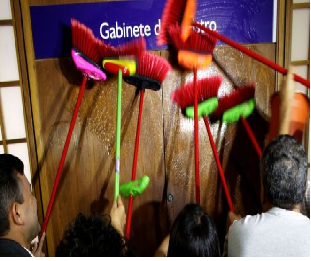The anti-corruption minister in Brazil's interim government has resigned, after a recording suggested he tried to derail an investigation into the state oil company, Petrobras.

Fabiano Silveira is the second interim minister to step down, a week after the planning minister resigned following the release of a similar recording.
Mr Silveira says his remarks have been taken out of context.
Both men were appointed by interim president, Michel Temer.
Mr Temer replaced Dilma Rousseff as president in 12 May, after she was suspended to face a Senate impeachment trial over allegations of massaging the budget ahead of her re-election in 2014.
She has argued that impeachment proceedings against her are designed to stop the investigation into Petrobras, known as Lava Jato, or Car Wash.In the recorded conversation broadcast on TV, Mr Silveira is heard apparently advising the speaker of the Senate, Renan Calheiros, and an ex-senator, Sergio Machado, on how to avoid investigations by prosecutors.
He is also heard appearing to criticise investigators in the Petrobras investigation, which has implicated dozens of senior politicians and has led to the jailing of several top business executives.
Mr Machado, who is also the former president of Transpetro, a logistics company owned by Petrobras, is being investigated for corruption. As part of a plea bargain with investigators he has recorded a series of conversations with high-profile politicians.
In his resignation letter, Mr Silveira said he was being targeted by "very unusual speculations".
"There is no opposition, in my words, to the works of the public prosecution's office or the judiciary," he said.
"Those were generic comments and simple opinion, certainly amplified by the climate of political exasperation we have all witnessed."
Where has the money gone? Brazil's scandals
- Mensalao, or big monthly allowances: corruption scheme in which public funds were illegally used to pay members of Congress in exchange for backing former president Luiz Inacio Lula da Silva's government in crucial votes. The scandal first broke in 2005. Some 25 politicians, bankers and businessmen were convicted, some of whom were top members of the Workers' Party.
- Lava Jato, or Car Wash: Investigation launched in 2014 into allegations that big construction firms overcharged state oil company Petrobras for building contracts. Part of their windfall would then be used to pay for bribes or campaign expenses. Dozens of high profile politicians and businessmen have been detained or implicated in the affair.
- Investigators are also looking into accusations of corruption in projects related to the 2014 World Cup and the 2016 Olympics.
- Pedaladas fiscais, pedalling, or delaying, fiscal obligations: President Dilma Rousseff accused of using accounting practices to hide the extent of the budget deficit. She says this is a common practice in Brazil and has accused her rivals of mounting a coup. Suspended from office in May and will face an impeachment trial in the Senate.
Prior to his resignation, staff at the ministry symbolically cleaned the building with broomsticks, and dozens of civil servants in the ministry's local offices offered their resignations in protest.
Last week, Romero Juca, a close advisor to Mr Temer and interim planning minister, resigned after recordings of conversations with Mr Machado were made public.
By BBC News photo: EPA

Reactie plaatsen
Reacties